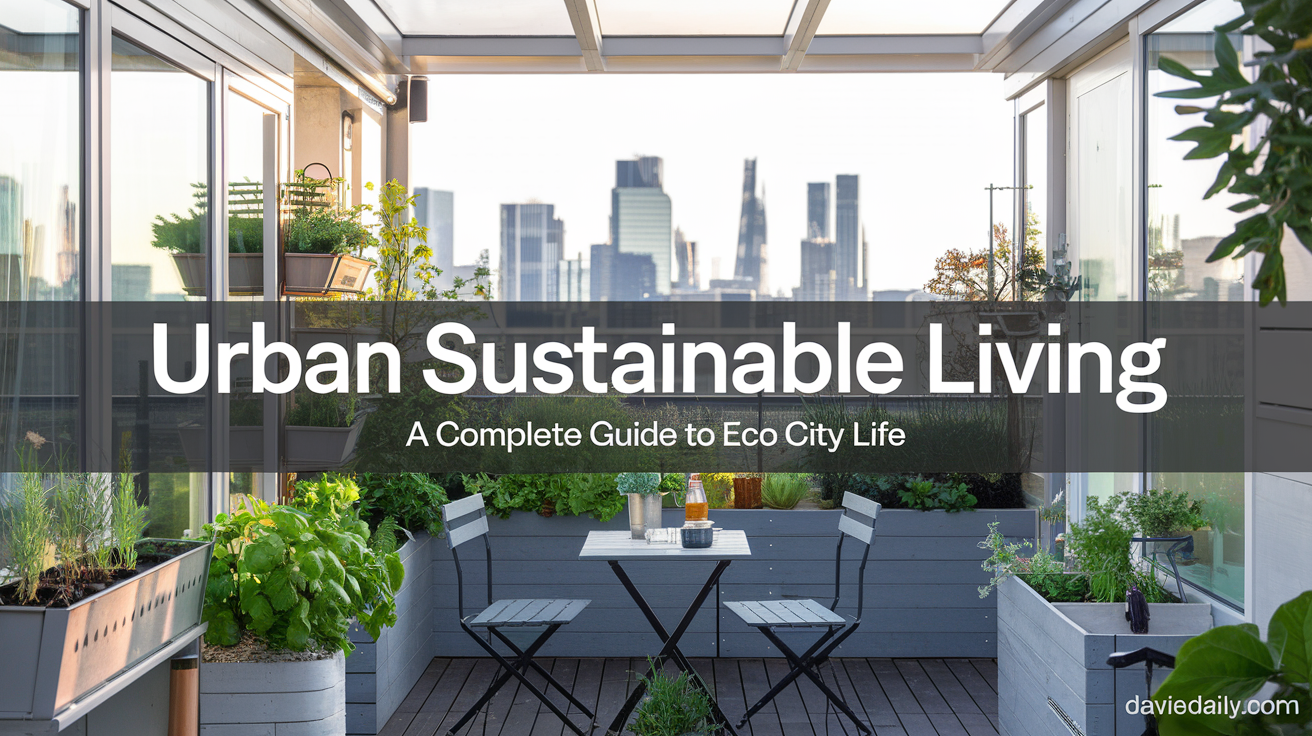Some posts may contain affiliate links. Read our disclosure [here].
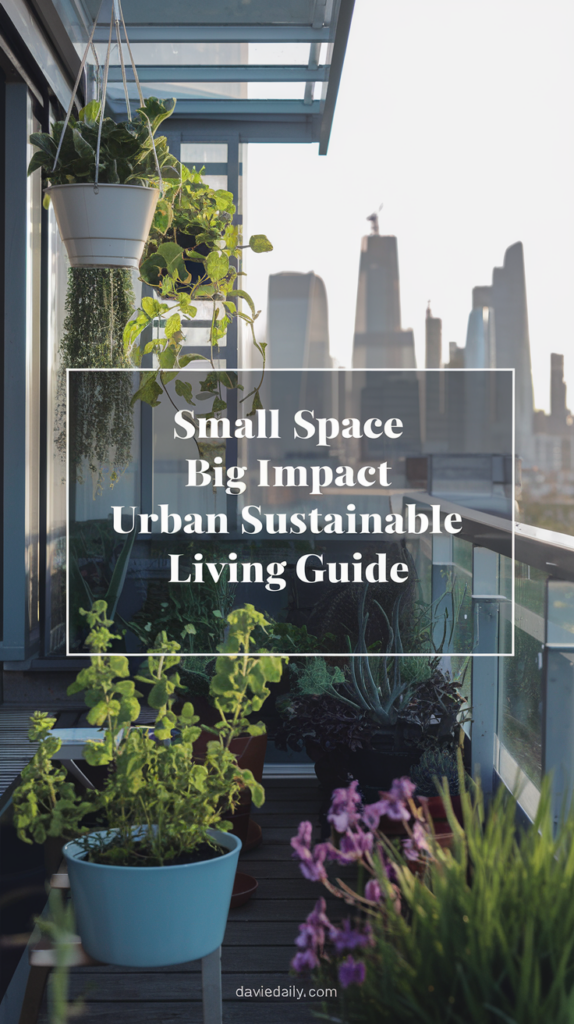
Living sustainably in a British city flat may seem impossible – but it’s truly an exciting opportunity to get creative with your space, save money, and help the planet. From growing your own food on tiny balconies to composting without a garden, urban dwellers across the UK are proving that you don’t need a countryside cottage to embrace eco-friendly living.
In this complete guide, we’ll show you smart, practical ways to transform your city pad into a sustainable haven, no matter how limited your space may be. Most of these solutions are compact, renter-friendly and designed for the unique challenges of urban living in Britain. So pop the kettle on and discover how to start your own urban sustainability journey today!
Quick Wins to Kickstart Your Eco City Life
Before diving into the big projects, let’s look at some easy sustainability wins that work brilliantly in British flats:
- Set up a windowsill herb garden. Growing your own herbs can save £3-4 per pot compared to store-bought. All you need is a sunny spot and a basic indoor herb growing kit. Look for kits with multiple herb varieties and self-watering planters for low-maintenance growth. Check out this Indoor herb garden kit.
- Install a shower timer. Challenge yourself to 5 minute showers and save up to £35 per year on your water bills. A digital shower timer makes it effortless to track. Opt for a waterproof model with a suction cup for easy installation and removal – perfect for renters. Digital shower timer
- Create a mini recycling station. Hang recycling bags or small containers on the back of a cupboard door for easy, space-saving sorting. Label each clearly for paper, plastic, glass and metals to avoid confusion. Stackable bins are another compact option for flats with a little more floor space.
- Collect rainwater on your balcony. Position a slimline water butt outside to gather free H2O for your plants. Collapsible designs are ideal for tiny terraces. Look for models with built-in filters to keep debris out, plus a tap for easy watering can filling.
Real-Life Urban Eco Inspo: Sarah from Shoreditch
“I started my windowsill garden with just three herb pots and now I’m hooked! It’s amazing how much you can grow in a tiny flat. My mini basil, mint and chive crops save me a fortune on supermarket herbs.” – Sarah, 28, Shoreditch
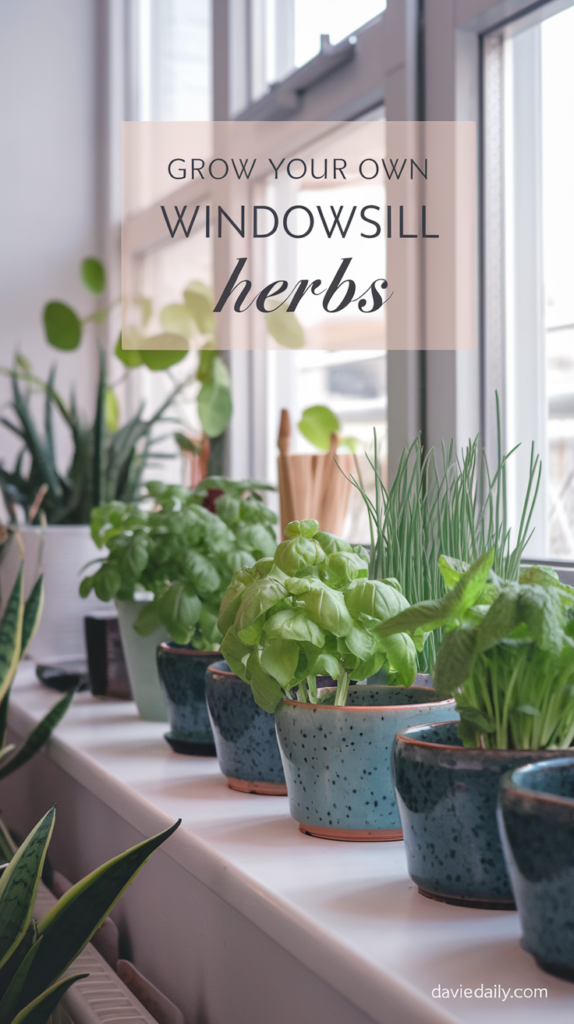
With just a few small investments and habit changes, you can kickstart your urban eco journey no matter your living situation. Now, let’s explore more ways to go green when space is at a premium.
Grow Your Own in the City: Balcony and Window Gardening
Think you need acres of land to grow your own food? Not so! With a little know-how, even the smallest outdoor spaces can become an urban oasis brimming with fresh produce, fragrant herbs and vibrant blooms.
Getting Started with Balcony Gardening
Success Tip: Choose the Right Planters Opt for lightweight pots with good drainage to maximise growing space. Railing planters hook over balcony railings to free up floor space while vertical garden systems like living walls can dramatically increase your planting potential. Stackable planters are another genius solution for tight spots. Vertical garden planters
Choose Plants for UK Urban Conditions British city balconies can get windy, shady and cold compared to ground-level gardens. Hardy herbs like rosemary, sage, mint and thyme tend to thrive, as do leafy greens like spinach, rocket and kale. For pops of colour, try petunias, geraniums and forget-me-nots – all compact, low-maintenance blooms. Dwarf tomato and chilli pepper varieties are great for sunny balconies.
Go Vertical to Maximise Space Think up, not out, when planning your balcony garden. Attach planters to walls and railings or create a sturdy trellis for climbing vegetables like peas and beans to maximise yields without sacrificing square footage. Trailing plants like strawberries and nasturtiums are also great vertical options.
Find the Light, Follow the Sun Most crops need at least 6-8 hours of direct sunlight per day. Track the sun’s movement across your balcony and position pots accordingly through the growing season. Reflective surfaces like mirrors and light-coloured walls can help bounce light into shady spots. South and west-facing balconies tend to get the most sun in Britain.
Dealing with Wind, Pollution & Pigeons
- Wind: Install a windbreak made of willow or bamboo screening to prevent soil erosion and plant damage. Weigh down pots and choose heavy ceramic over lightweight plastic.
- Pollution: Grow pollution-tolerant plants like lavender and avoid edibles if you live on a busy road. Regularly wash leaves to remove chemical residue.
- Pigeons: Choose spiky or strongly scented plants to deter birds. Tightly packed leaves also make it harder for them to land. You can also install humane bird netting around crops.
No Balcony? Grow Indoors! If you lack outdoor space entirely, a sunny windowsill is your best bet for homegrown produce. Pot up herbs, chilli plants, micro greens and dwarf citrus trees for year-round flavour. Mushroom growing kits are another fab option that can thrive in darker indoor spots.
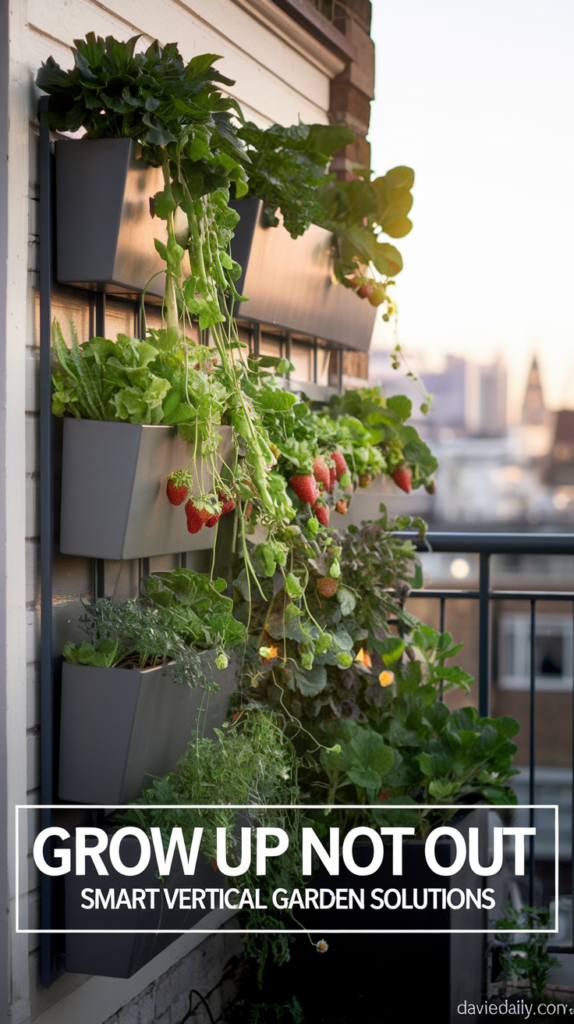
By growing your own food, however small the scale, you’ll slash your carbon footprint from transport and packaging, plus connect with nature in the heart of the city. It’s a real win-win!
Composting Without a Garden: Small Space Solutions
Composting is key for sustainable living, keeping food waste out of methane-producing landfills to nourish plants and soil instead. While British city dwellers rarely have space for a traditional compost heap, there are still plenty of odour-free, neighbour-friendly options for flats of all sizes:
- Bokashi Bins: These compact systems use bran inoculated with beneficial bacteria to ferment food scraps. Keep one tucked under your kitchen sink and just add your fruit and veggie waste each day – you’ll end up with nutrient-rich compost tea for your plants. No smells, no bugs, no mess!
- Wormeries: If you have a balcony or well-ventilated utility room, a worm composter is a great option. Simply feed your leftovers to the hungry wrigglers and let them work their magic, turning food waste into rich, organic fertiliser and soil conditioner. Wormeries come in compact, stacking designs perfect for limited spaces.
- Electric Composters: High-tech, odour-free and sized for even studio flats, electric composters use a small amount of electricity to speed up the composting process. Just plug in, add your food scraps and enjoy fresh compost in as little as 48 hours – no worms or outdoor space required.
- Community Composting: Many British councils now offer food waste collection services. Some community gardens and allotment sites also welcome food scraps from local residents if you lack the space to process them at home. Do a little research into communal composting schemes in your area.
Troubleshooting Common Composting Issues:
- Fruit Flies: To prevent flies, bury food scraps completely in bokashi or worm bins and keep the lid sealed. You can also make a homemade fruit fly trap by leaving out a bowl of vinegar.
- Smells: Proper aeration is key for preventing smells. Regularly mix and turn your indoor compost to introduce oxygen. Avoid adding dairy, meat or oily foods.
- Lack of Brown Material: Shredded newspaper, cardboard egg cartons and used paper towels can provide the carbon-rich ‘brown’ material needed for balanced compost in the absence of garden twigs and leaves.
With both indoor and communal solutions available, there’s no excuse for binning your banana peels. A little research into what’s available in your area can help you start composting this week – your plants (and the planet) will thank you!
Energy Efficiency for Flats and Terraces
We hear you: it’s hard to conserve energy when you can’t change much about your building itself. Drafty windows, outdated appliances and communal heating systems can make efficiency an uphill battle. But small tweaks really can add up to serious savings on your bills and carbon emissions. Here’s where to start:
Easy Energy Savers for City Rentals:
- Upgrade your lighting: Swapping old incandescent bulbs for LEDs can dramatically cut lighting costs. Install them in your most-used fixtures first for the biggest impact.
- Insulate windows: Single-glazed windows are common culprits for heat loss in British flats. Thermal curtain linings and removable double glazing film can boost insulation at a fraction of the cost of new windows.
- Use smart plugs: Energy vampires like TV sets, game consoles and coffee makers drain electricity even when turned off. Use smart plugs to cut their power supply completely and schedule them to switch off while you’re out. Smart plugs
- Zone your space: In open-plan flats, use room dividers, draft excluders and thermal curtains to create smaller zones to heat and cool as needed. Only heat the rooms you’re using to avoid wasting energy.
- Tweak your habits: Little changes like only boiling the water you need, air drying laundry and making sure your dishwasher is full before running it can shave serious amounts off your utility bills.
Advanced Energy Upgrades to Propose to Your Landlord:
While bigger retrofits depend on your landlord, there are compelling arguments for them to invest in eco upgrades. If you have a good relationship, it’s worth suggesting:
- Switching to a renewable energy tariff or provider
- Replacing outdated boilers and appliances with efficient models
- Installing smart thermostats and radiator valves for custom heating control
- Insulating walls, roofs and pipes to minimise heat loss
If your landlord is reluctant, see if they’re open to you shouldering some of the cost in exchange for lower rent. Many energy suppliers also offer discounts and installation deals for upgrades like smart meters – something to look into that could benefit you both.
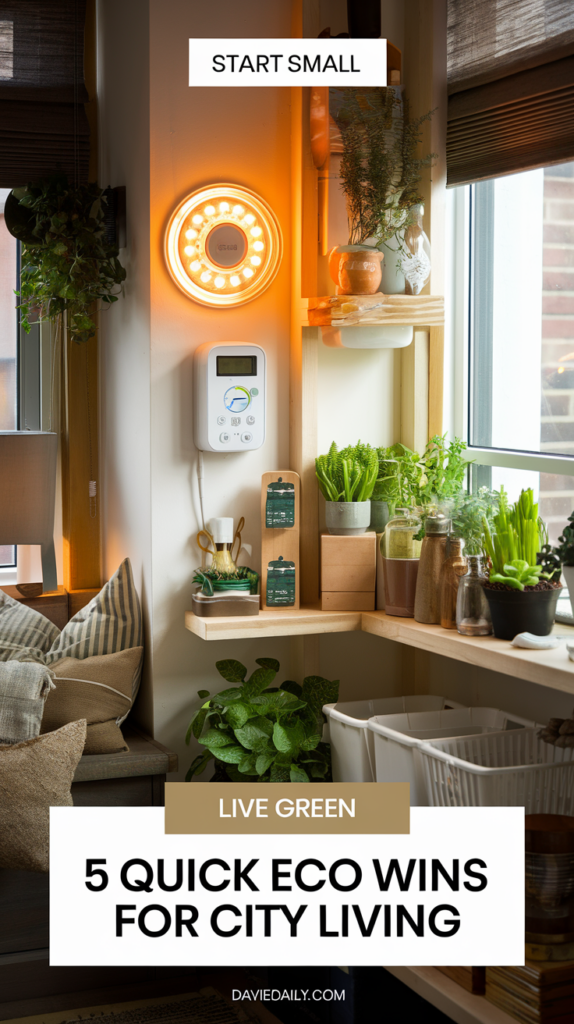
Your Urban Eco Journey Starts Here
Living sustainably in a British city doesn’t mean overhauling your entire life. By starting small, tapping into your community and gradually investing in eco-friendly solutions, you can transform your urban pad into a green oasis that benefits your wallet, your wellbeing and the planet.
This week, choose one quick win to implement, like setting up an indoor herb garden or organising a mini recycling station. Then, keep exploring the possibilities for your space. Could your sunny balcony become a pollinator paradise with bee-friendly blooms? Would your building manager support a community composting scheme? The only limit is your imagination.
Together, our small changes can add up to a mighty difference – so let’s start creating the eco-friendly cities of the future, one balcony at a time. If you’re feeling inspired, we’d love to hear about your own urban sustainability journey. Share your photos, tips and projects with us on Instagram using #ecocitylife and let’s keep this green revolution growing!

